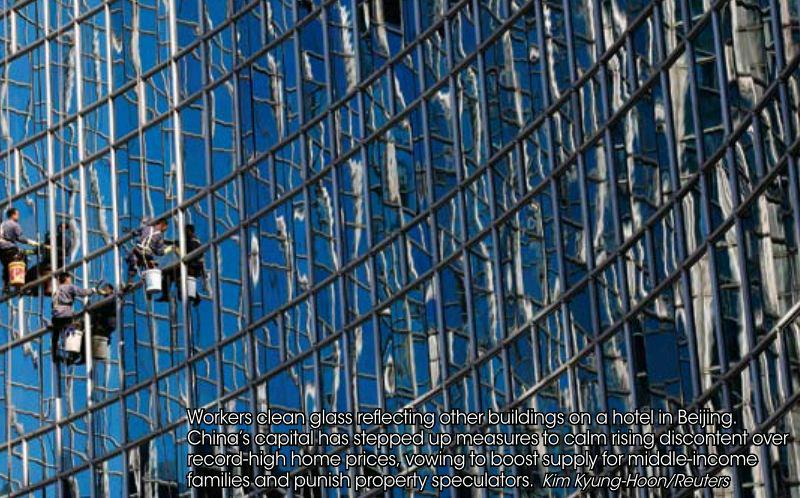2014: Deepening Reform
by+Ji+Lin
On March 6, 2014, during the two sessions – National Peoples Congress (NPC) and Chinese Peoples Political Consultative Conference (CPPCC), Chinese President Xi Jinping attended the deliberation of deputies from Guangdong Province, stressing a strong awareness of historic responsibilities and maintaining boldness in terms of reform.
Obviously, the idea of “being bold in reform” has become a contemporary value. The Decision on Major Issues Concerning Comprehensively Deepening Reforms by the CPC Central Committee (hereinafter referred to as “Decision”) was adapted at the 3rd Plenary Session of the 18th CPC Central Committee held in November 2013. The 336 items on the detailed account of major reform in the Decision evidence the Chinese governments determination and courage to reform. “Being good at reform”means to catch breakthroughs by following a correct path from easier to more ad-vanced levels of deepening reform. It relies more on wisdom than courage.
As for judgment of current reform in China, members of the new generation of the central collective leadership have expressed feelings with one voice on different occasions: Chinas reform has entered a critical stage and deep waters, meaning that it is more difficult for the country to deepen reform which will differ from its early stages.
How Deep Is the Water?
China first initiated reform and opening-up policies in 1978, aiming at breaking ideological shackles and developing its economy. Today, China is the worlds second largest economy, with an extremely large economic pie and unprecedented vested interests.
At his first press conference in 2013 after taking office as Chinas premier, Li Keqiang frankly stated, “It is harder to touch ones interests than his soul.” At a press conference in 2014, Premier Li stressed again, “Reform will touch peoples interests and remove ‘their cheese. As powers are delegated to lower levels, some will surely have less power in hand. However, a good way to alleviate pressure on enterprises is through relaxing control over market access and intensifying market competitiveness. Well proceed with effective measures without hesitation as long as the benefits of reform are released and the people see benefits.”
Premier Li remarked at a press conference on March 13, 2014, “We are prepared to take on tough challenges in pursuing this reform initiative.” The vested interests, which are clearly seen in special interest groups, are mainly state-owned enterprises.
“Right now, there is still space for incremental reform even if we beef up watershed reform,” opined Chi Fulin, member of the CPPCC National Committee. “Such a move will definitely involve in-depth adjustment of the original interest patterns, which is natural in the reform of state-owned enterprises and monopolized industry.”
Diversified Ownership
The Decision defines the requirements for actively developing a diversified ownership economy so as to deepen reform of state-owned enterprises. A new round of reform of state-owned enterprises had started prior to the two sessions in March 2014. In comparison to state-owned enterprises under the jurisdiction of the StateOwned Assets Supervision and Administration Commission of the State Council, local governments are more enthusiastic about accelerating reform of ownership in state-owned enterprises. By March 20, 2014, more than 20 provinces and municipalities had mapped out plans for reform of state-owned enterprises on the premise of diversified ownership.
The implementation of diversified ownership aims to reap benefits of reform from state-owned enterprises. Currently, state-owned enterprises return on equity is 5.9 percent, while that for non-state-owned has reached 11.1 percent. “Private capital possesses great potential on the market,”asserts Sun Qingtai, managing vice president of the China Association for Small and Medium Commercial Enterprises. “It is sensitive to the market, with more flexible marketing ability. The participation of private capital will inspire greater ways of thinking and technologies for innovation and make up for deficiencies of stateowned enterprises, thus strengthening their competitiveness.”
Streamlining Administration and Decentralizing Power
If diversified ownership serves as a breakthrough for the deepening of reform in the economic realm, the idea of “streamlining administration and decentralizing power” is believed to be key to the reform of administrative systems.
In his government report delivered at the two sessions in 2014, Premier Li described “streamlining administration and decentralizing power” as “a revolution the government imposes on itself.” Since 2013, the State Council has canceled and delegated more power to lower-level governments for 416 items previously requiring State Council review and approval. It has planned to keep moving 200-plus more items in 2014, which is near the goal set by decision makers.

With an aim to curtail the Central Governments administration over microcosmic affairs, the “power decentralization” policy will give full play to market mechanisms so as to elevate local governments efficiency and enhance bottomround management.
Nevertheless, low efficiency caused by governmental examination and approval has remained a target of public criticism at the two sessions even though the government has already accelerated its pace of“streamlining administration and decentralizing power.”
Premier Li is fully aware of issues occurring during the implementation of“streamlining administration and decentralization,” which he illustrated as “in the course of power delegation there have been such problems as perfunctory attitudes, midway obstruction or power delegation getting stuck in the final stretch” when he answered questions at a press conference on March 13, 2014. Also, he noted the governments determination to “oversee all and press forward with indomitable will.”“We need to ensure that market entities can do anything which is not prohibited by the law, and government departments cannot do anything unless it is mandated by law.”
“Streamlining administration and delegating power” has been taken as one of the important starting points for the government to deepen reform. It is a powerful tool to energize the market and stimulate social creativity as well as the fundamental solution for cutting malevolent behavior and uprooting corruption.
Air, Air!
It seemed that another focus for media during the two sessions was crackdown on“tigers” – high-ranking corrupt officials. However, deputies seemed more concerned with environmental management than combating corruption.
At a press conference the day before the opening of the 2nd Plenary Session of the 12th CPPCC, Spokesman Lu Xinhua ranked air pollution as the top issue concerning peoples livelihood.
During the two sessions, environmen- tal protection consistently topped lists of proposals and suggestions, most of which involved smog that has engulfed most parts of the country for so long. One of the most noticeable of all proposals was one submitted by Zhu Lieyu, deputy to the NPC. It clearly suggested that the Minister of Environmental Protection (MEP) should make a work report at the annual “two
sessions” and take the blame and resign if his or her report fails to garner at least 50 percent approval.
The environmental protection issue has aroused unprecedented attention because it is severer than ever before. Immediately before the two sessions, Chinas northern region was hit by heavy air pollution for a full week in late February – 15 percent of the sky was covered in smog.
Latest statistics reveal that in 2013, ten provincial governments out of 31 referred to smog control in their government reports at the local two sessions. In 2014, the figure increased by 29.
Wang Anshun, mayor of Beijing, announced that the municipal government has signed a “life-and-death contract” with the Central Government to control air pollution. “It will be my head if I break the contract by 2017.”
Huang Xingguo, mayor of Tianjin, pledged to make great breakthroughs in the control of coal, vehicles, dust, and pollution in 2014.
Zhang Qingwei, governor of Hebei, pointed out that the annual production capacity of products such as iron and steel, cement, and sheet glass should be limited to one ton, or the person in charge should be removed from office on the spot.
Compared with measures initiated by local governments, the Central Government is facing a big problem with its own efforts to accelerate environmental protection: Each department acts on its own with unclear powers and duties. Apart from the MEP, other governmental departments, such as the Ministry of Land and Resources, the Ministry of Water Resources, the Ministry of Agriculture, and the State Oceanic Administration, are also authorized with powers related to the direct administration of environmental protection.
“The issue requires comprehensive adjustment ranging from national strategy to current systems to break ground in environmental protection,” stated Pan Yue, vice minister of Environmental Protection.
“The government will declare war against smog and pollution as a whole,”announced Premier Li Keqiang when questioned about smog at a press conference on March 13, 2014. “In fighting pollution, we need both tough measures and tough regulations. The government will severely punish illegal emission activities which harm both nature and human health. And overseeing agencies that turn a blind eye to polluting activities and fail to perform their overseeing duties will be held accountable.”
